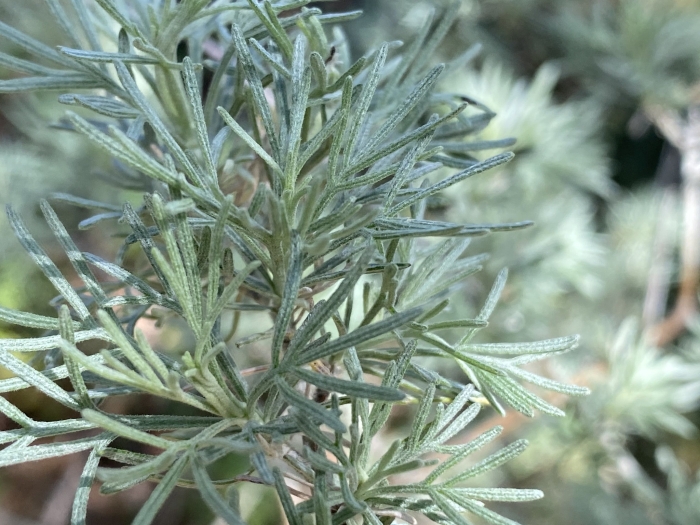California Sagebrush
(Artemisia californica)
California Sagebrush (Artemisia californica)
/
/

Dana L. Brown
CC BY-SA 2.0
Image By:
Dana L. Brown
Recorded By:
Copyright:
CC BY-SA 2.0
Copyright Notice:
Photo by: Dana L. Brown | License Type: CC BY-SA 2.0 | License URL: https://creativecommons.org/licenses/by/2.0/ | Uploader: Dana L. Brown | Publisher: Flickr |








































































Estimated Native Range
Summary
Artemisia californica, commonly known as California sagebrush, is a perennial shrub in the sunflower family native to the chaparral and coastal sage scrub of California and Baja California, Mexico. It typically grows to a height of 3-5 feet and a width of 5-7 feet. The plant is characterized by its fine, feathery foliage and its aromatic quality due to the presence of terpenes, which give it a pleasant, sage-like smell. The flowers are small and inconspicuous, with pistillate flowers numbering 6 to 10 and disk flowers ranging from 15 to 30, usually yellowish but sometimes with a reddish tinge. Flowering occurs from late summer to fall.
California sagebrush is valued for its drought tolerance and aromatic foliage, making it a popular choice for native plant gardens, wildlife habitats, and natural landscaping designs. It is also used in restoration projects for disturbed sites and degraded coastal sage scrub areas. Several lower-height cultivars are available for use as drought-tolerant ground cover. This shrub thrives in full sun and is adapted to west or north-facing slopes. It is highly drought-tolerant, requiring little to no water during the summer months, and is not particular about soil types. While it relies on wildfire for seed germination, it can also resprout from the crown after being burned. In cultivation, it does best with low water input and well-drained soils. Gardeners should be aware that while it is not typically invasive, it can spread through root suckers if conditions are favorable.CC BY-SA 4.0
California sagebrush is valued for its drought tolerance and aromatic foliage, making it a popular choice for native plant gardens, wildlife habitats, and natural landscaping designs. It is also used in restoration projects for disturbed sites and degraded coastal sage scrub areas. Several lower-height cultivars are available for use as drought-tolerant ground cover. This shrub thrives in full sun and is adapted to west or north-facing slopes. It is highly drought-tolerant, requiring little to no water during the summer months, and is not particular about soil types. While it relies on wildfire for seed germination, it can also resprout from the crown after being burned. In cultivation, it does best with low water input and well-drained soils. Gardeners should be aware that while it is not typically invasive, it can spread through root suckers if conditions are favorable.CC BY-SA 4.0
Plant Description
- Plant Type: Shrub
- Height: 3-5 feet
- Width: 5-7 feet
- Growth Rate: Rapid
- Flower Color: N/A
- Flowering Season: Spring, Summer, Fall
- Leaf Retention: Evergreen
Growth Requirements
- Sun: Full Sun
- Water: Low
- Drainage: Fast, Medium
Common Uses
Bank Stabilization, Bee Garden, Bird Garden, Butterfly Garden, Deer Resistant, Drought Tolerant, Erosion Control, Fragrant, Groundcover, Low Maintenance, Potted Plant, Rabbit Resistant, Salt Tolerant, Street Planting
Natural Habitat
Native to the chaparral and coastal sage scrub of California and Baja California, Mexico
Other Names
Common Names: Coastal Sagebrush
Scientific Names: Artemisia californica , Artemisia abrotanoides , Artemisia californica var. californica , Artemisia fischeriana , Artemisia foliosa , Artemisia fischeriana var. fischeriana , Artemisia fischeriana var. vegetior , Crossostephium californicum , Crossostephium foliosum
GBIF Accepted Name: Artemisia californica Less.